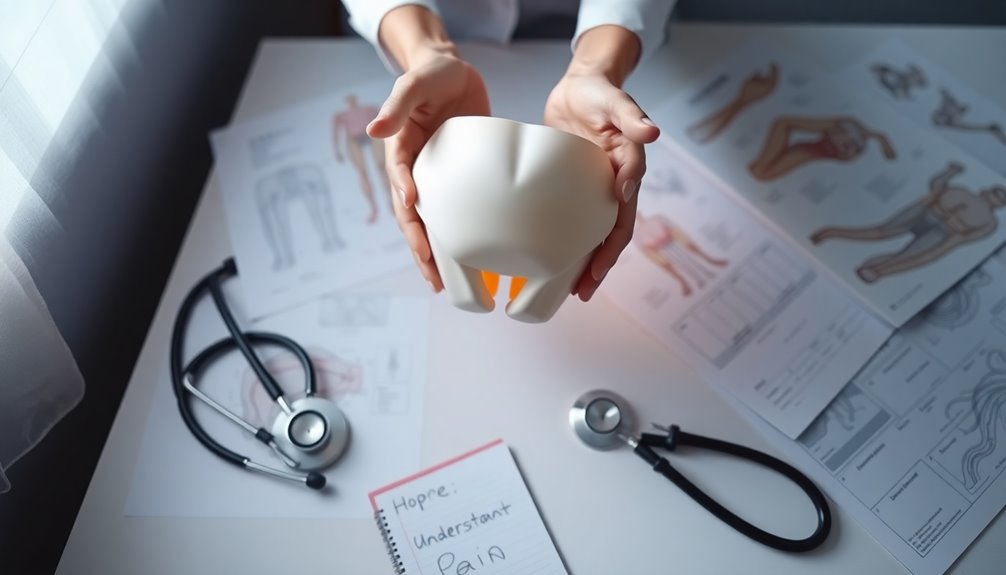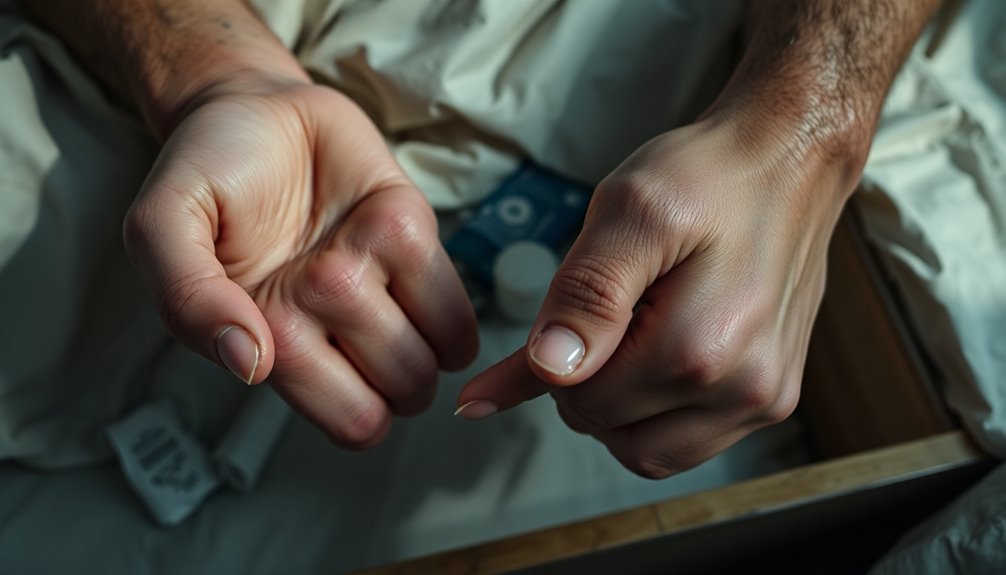Sex can hurt for a variety of reasons, and you're not alone if you're experiencing this discomfort. Common physical causes include vaginal dryness, infections, and conditions like endometriosis. You might feel sharp or throbbing pain during penetration or even during tampon insertion. Emotional factors like anxiety and past trauma can also contribute, magnifying the physical pain. It's important to communicate openly with your partner and consult a healthcare provider for a thorough evaluation. Addressing these issues can enhance both your physical and emotional well-being, allowing for a more fulfilling sexual experience. There's much more to explore on this topic.
Key Takeaways
- Dyspareunia, or painful intercourse, often stems from physical issues like vaginal dryness, infections, or medical conditions such as endometriosis.
- Psychological factors, including anxiety and past trauma, can exacerbate pain during sex.
- Insufficient lubrication and hormonal changes, especially during menopause, can lead to discomfort during intercourse.
- Chronic conditions like pelvic inflammatory disease can contribute to ongoing sexual pain.
- Open communication with partners and healthcare providers is essential for addressing and managing the causes of painful sex.
Understanding Dyspareunia

Understanding dyspareunia can feel overwhelming, especially when pain disrupts what should be an enjoyable experience. This condition, characterized by painful intercourse, can affect anyone but is more commonly reported by individuals assigned female at birth.
You might experience recurring pain before, during, or after sex, often described as sharp or throbbing. Common causes include vaginal dryness, infections, and medical conditions like endometriosis.
Additionally, psychological factors—such as anxiety, depression, and past trauma—can contribute to this sexual dysfunction, affecting your pelvic floor muscles and overall comfort.
It's essential to take into account both physical and mental health when addressing dyspareunia. A thorough medical history and examination can help identify the underlying issues, guiding you toward effective treatment options.
Symptoms of Painful Intercourse

Experiencing discomfort during intercourse can manifest in several ways, making it important to recognize the specific symptoms you might encounter.
Dyspareunia often presents as sharp pain during penetration, deep pain during thrusting, or throbbing sensations that linger for hours. You may notice discomfort when inserting a tampon or during gynecological exams, indicating sensitivity in the genital area.
This pain can feel burning, aching, or cramping, and may be localized to the vulva, pelvic floor muscles, vaginal canal, or lower abdomen.
Psychological symptoms, such as anxiety or stress, can accompany physical pain, especially if you have a history of sexual trauma. Identifying whether you're experiencing entry pain or deep pain is essential for understanding potential underlying causes.
Causes and Risk Factors

Painful intercourse, or dyspareunia, can stem from a variety of causes, making it essential to identify the underlying issues.
Physical factors like infections, hormonal changes, and insufficient lubrication can lead to significant discomfort during sex. Chronic conditions such as endometriosis and pelvic inflammatory disease also contribute to deep pain.
Additionally, psychological factors, including anxiety and depression, can exacerbate this issue, causing you to avoid intimacy altogether.
Risk factors for dyspareunia include chronic illnesses, relationship problems, and hormonal fluctuations during menopause, which often result in vaginal dryness.
Many experience painful intercourse due to a combination of these factors, underscoring the need for a thorough evaluation to improve your sexual health and find effective management strategies.
Diagnosis and Treatment Options

Diagnosing dyspareunia involves a thorough approach that starts with your medical history and a physical examination.
Your healthcare provider may conduct tests for infections or imaging studies to pinpoint underlying conditions causing painful intercourse.
Treatment options depend on the specific causes of dyspareunia. Hormonal therapies can address issues like vaginal dryness, while physical therapy may help with pelvic floor dysfunction.
Psychological counseling is crucial for those facing emotional factors. Over-the-counter lubricants can alleviate discomfort, and prescription medications might be necessary for conditions such as endometriosis or vulvodynia.
Regular gynecological check-ups are essential for early detection and prevention, emphasizing the need for open communication with your healthcare provider to guarantee effective diagnosis and treatment.
Impact on Sexual Health

While many may think of sexual health solely regarding pleasure, the reality is that conditions like dyspareunia can greatly alter your sexual experience and overall well-being.
When you experience pain during sex, it's not just a physical issue; it can lead to emotional consequences like anxiety and depression. These feelings can decrease your sexual satisfaction and strain relationships.
Open communication with your partner about any pain can help maintain intimacy and reduce feelings of isolation. Many hesitate to discuss this with healthcare providers due to stigma, but addressing the underlying causes is essential.
A thorough medical evaluation can identify what's causing pain and lead to effective treatment, ultimately helping to improve your sexual health and enhance your quality of life.
Frequently Asked Questions
Is It Normal for Sex to Hurt?
It's not normal for sex to hurt consistently.
While occasional discomfort can happen, persistent pain might indicate an underlying issue. About 10-20% of sexually active people experience this, and if you're facing frequent or severe pain, it's essential to seek medical advice.
Factors like inadequate lubrication or medical conditions could be at play.
How Do I Stop Sex From Hurting?
Imagine you're at a dance party, but your shoes are too tight.
To stop sex from hurting, you should start by prolonging foreplay to boost natural lubrication.
Don't forget to use personal lubricants for added comfort.
Experiment with different positions to find what feels best for you.
Communicate openly with your partner about any discomfort.
If pain persists, consult a healthcare provider to uncover any underlying issues and find effective solutions.
Why Does Sex Hurt so Bad at First?
When you experience pain during your first sexual encounter, it can often stem from a lack of lubrication, causing friction and discomfort.
Your body might also be tense from nerves or anxiety, making it harder to relax.
Additionally, if you have an intact hymen or certain medical conditions, these factors can contribute to discomfort.
It's crucial to communicate openly with your partner and explore ways to enhance comfort and relaxation during intimacy.
Why Do I Feel Pain When I Want Sex?
"When it rains, it pours."
You might feel pain when you want sex due to a mix of physical and emotional factors. Insufficient lubrication or medical conditions can create discomfort, while anxiety or past trauma can trigger anticipatory pain.
This cycle can make intimacy challenging, even when desire is strong. It's vital to communicate openly with your partner and seek professional guidance to address both the physical and psychological aspects of your experience.
Conclusion
If you're dealing with painful intercourse, you're not alone, and it's essential to address it. Understanding the underlying causes can help you find the right treatment and improve your sexual health. Don't let this issue linger; it's time to take the bull by the horns and seek help. Open communication with your partner and a healthcare provider can make all the difference, ensuring that intimacy becomes a source of pleasure rather than pain.










